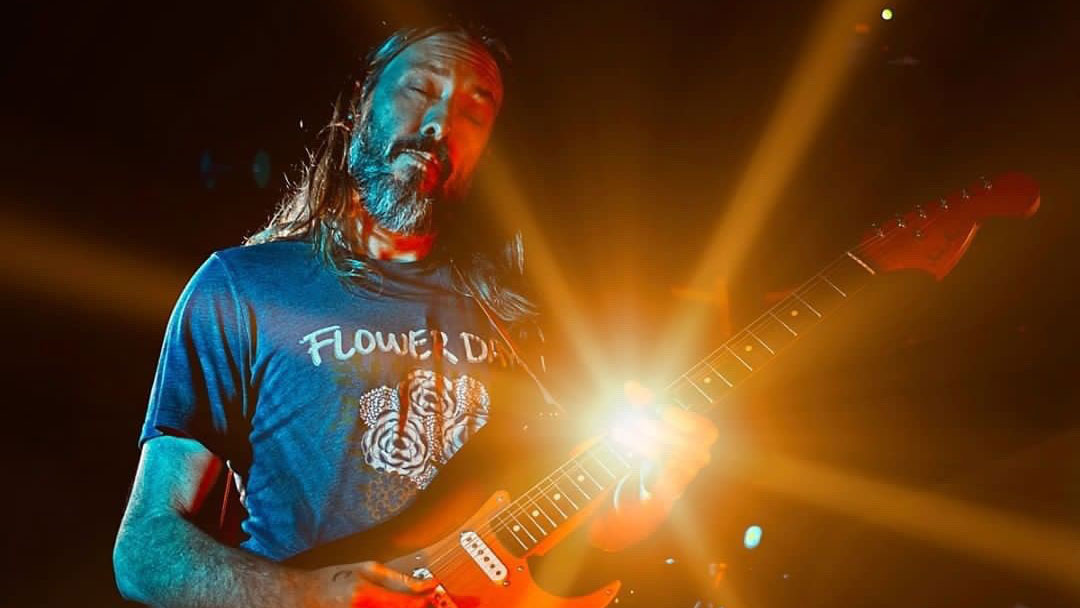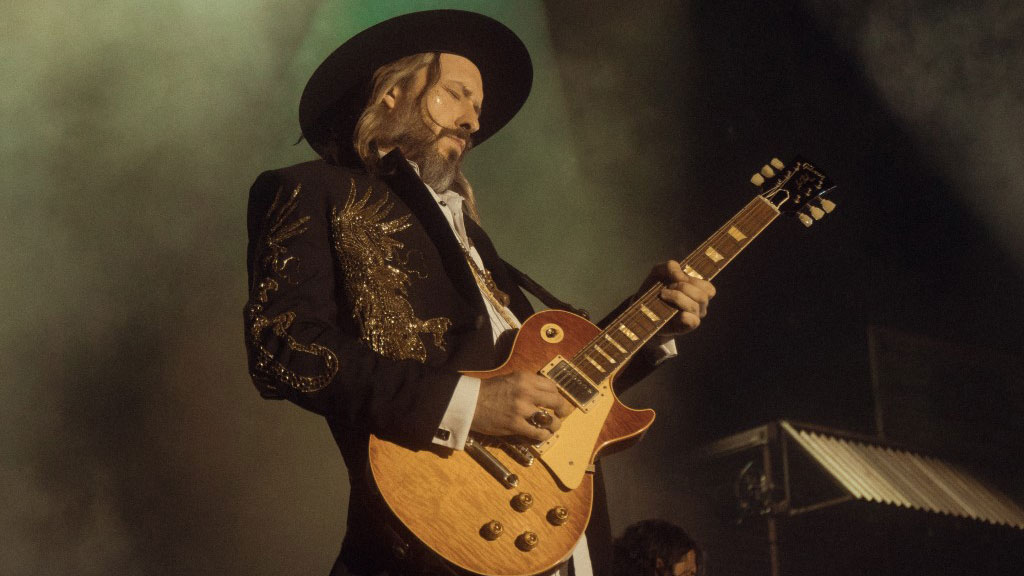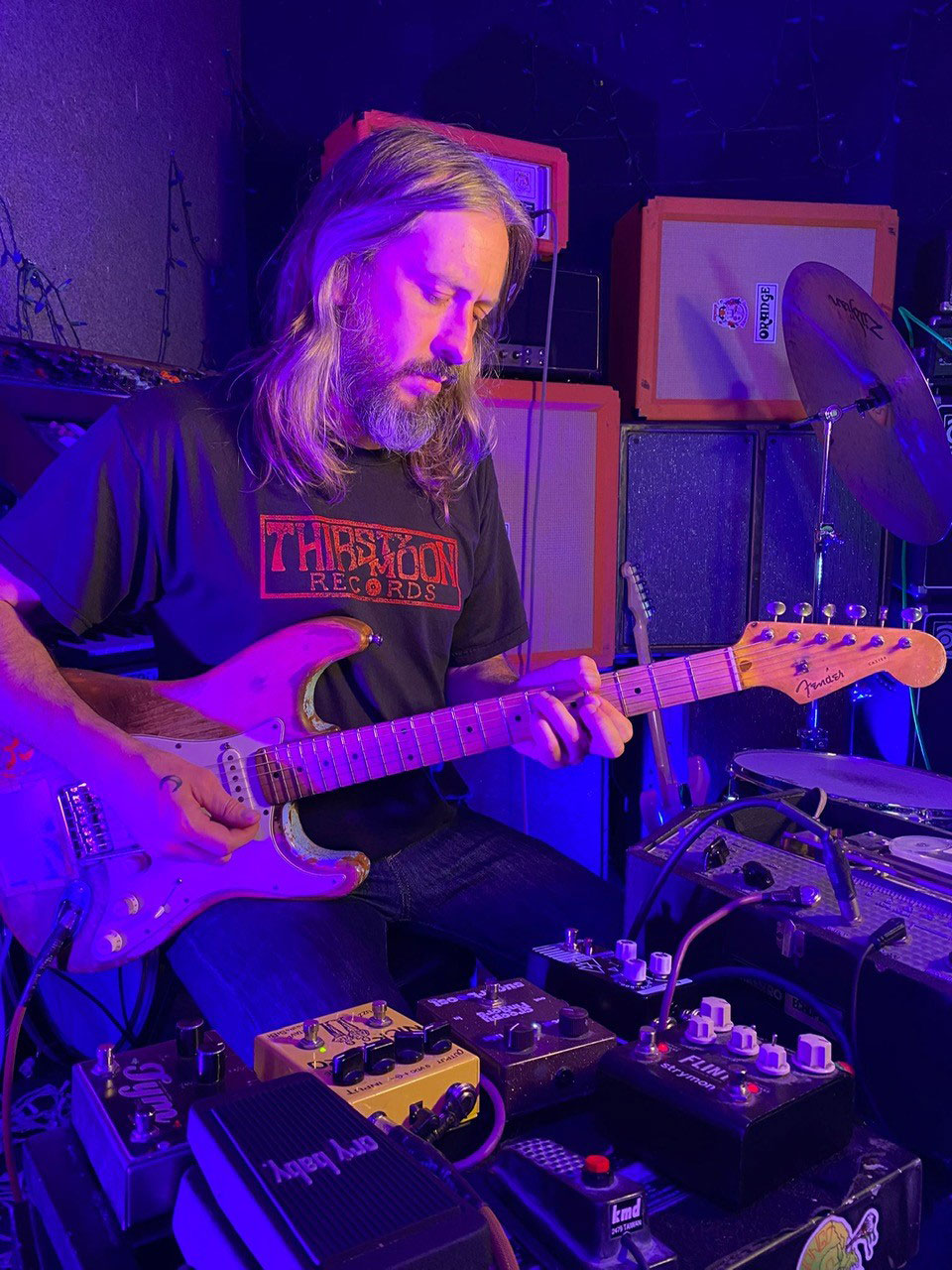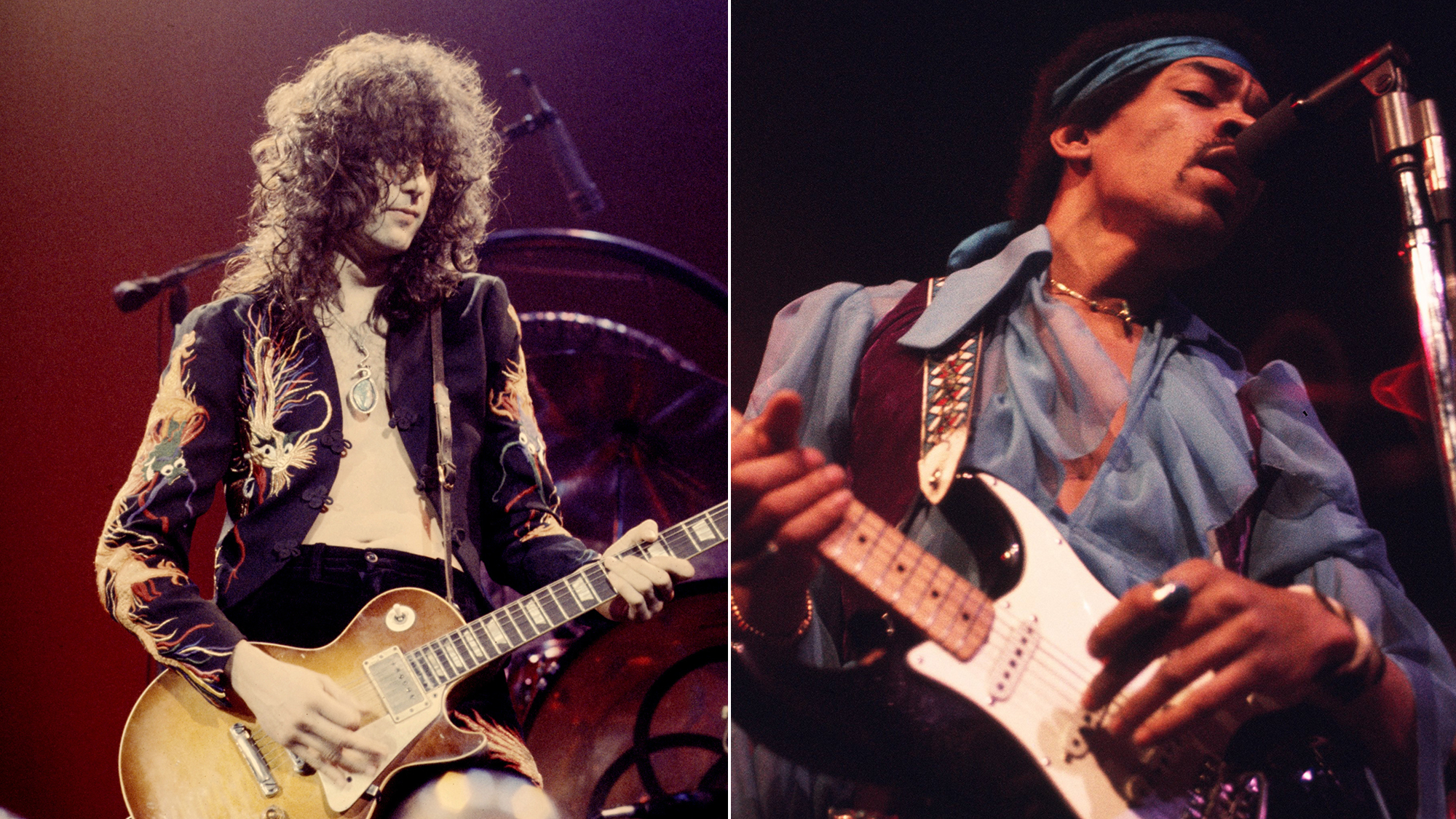Isaiah Mitchell: "I played Les Pauls, Teles and Strats with the Black Crowes, but with Earthless, Strats are my number one. They're the most versatile guitars out there"
The Earthless founder on 22 years of freeform inspiration, his arsenal of high-wattage amps and why he's no longer with the Black Crowes

As the lead guitarist of Earthless for the past 22 years, Isaiah Mitchell has provided explosive swells of ethereal textures, soaring forth from stacks of Marshall amps.
But dating back to 2019, Mitchell most recently found himself a member of the Black Crowes' ongoing guitar carousel. To that end, Mitchell contributed to the Atlanta rocker's legacy mostly via the live setting. However, he did manage to get into the studio with the Brothers Robinson for the group's six-song EP, 1972, released in 2022.
Though it's not been widely reported, Mitchell jettisoned himself from the Crowes in December of 2022, making the hard decision to put Earthless first. It was a matter of logistics, with more than a few aching heartstrings factoring into the proceedings.
When asked if he has any regrets regarding his time with the Black Crowes, Mitchell said: "I had a great time with the Crowes. I have no regrets. I just couldn't make both bands work, and so I had to decide based on what I felt was best. Being in the Crowes was totally different from what I've done with Earthless, and it was incredible to be in that position and put different things into practice."
"It was a constant lesson in serving the song," Mitchell continues. "Honestly, my time with the Crowes was great. It was a great exercise for me as a guitarist. It reminded me that I do enjoy the two-guitar setting, and I look forward to playing with other musicians in the future, where it's going to be a couple of guitar players. I love that dynamic, and that's just one of the many things that I was grateful for. To have had that different musical experience was awesome. I fucking loved it."
Amid preparations to head down under for an Australian tour, Isaiah Mitchell dials in with Guitar World to give the rundown on the end of his time with the Black Crowes, scouring the depths of his musical soul with Earthless, the latest gear populating his pedalboard, and what's next for him as he moves ahead.
As I understand it, you've left the Black Crowes. What led to your departure?
Get The Pick Newsletter
All the latest guitar news, interviews, lessons, reviews, deals and more, direct to your inbox!
"Yeah, I quit in December. I think they've already got a new guitar player [Nico Bereciartua]. They're starting to play some shows with him, so it's all good. I had to leave because I couldn't be in both Earthless and the Crowes.
"I couldn't give both bands the attention they needed, so I had to make a choice. I had to decide if I wanted to do another full year with the Crowes, because if I did, I knew that Earthless would suffer. There were going to be times when the Crowes would have gigs, and I'd have to turn down Earthless gigs and keep the band off the road. So, trying to do both at the same time just wasn't something that was going to work. I had to make the change; that's not something that I wanted to do to my band."
Did you depart on good terms?
"As far as I know, everything is fine. I mean, I'm okay on my end. I'm so grateful for the opportunity; it was fucking amazing. It's an honor to have been able to have that experience, and to have been able to play on that stage with those guys. I grew up with those songs, so to play them with the guys was a fantastic experience.
"Ultimately, I just couldn't keep doing both. If summer was twice as long and spring was twice as long, and the year, overall, was twice as long, yeah, I could have. But sadly, they're not."
What did you take away from your time with the Crowes that you'll carry with you going forward?
For 20 years with Earthless it's just been a guitar onslaught. My brain was trained that way, so working with the Crowes brought me back to a more courteous approach
"I really like being back in a musical situation where I'm playing with another guitar player and a keyboard player. Being in a situation where there are more melodic instruments going on, and there are a lot of pieces to the puzzle, and it's a lot of fun. Whereas in a three-piece, it's like, I can just be loud and proud. Because, for the most part, I've got to fill up a lot of space with a three-piece. So, being back in a position where I'm being asked to be sparser and not having to go all over the place was something different.
"In a way, it was a limiting thing and more about serving the song where I don't have to insert myself so much. Having to do that because that's what the song needs, and that's how it was written; I really liked that. I enjoyed working with Rich [Robinson] in dialing that in, because for like 20 years with Earthless it's just been a guitar onslaught [laughs]. My brain was trained that way, so working with the Crowes brought me back to a more courteous approach."
Describe your compositional approach as a guitarist, considering the music of Earthless seems to possess some deeply improvisational elements.
"Oh, yeah, for sure. There's a huge freeform element in Earthless. If Mike [Eginton], the bass player, or I don't have a riff or idea to bring to the practice space, we'll start jamming and messing around. With that approach, basically, when we hear something that we like, we'll record it. And if we hear something after the fact, and we think it might fit somewhere, we'll go back and find that part and continue to develop it and let it blossom on its own.
"More or less, the approach that we take with our music is: whatever feels right, we do it. If it needs to go longer, then it's gonna go longer. If it needs to be shorter, then we'll shorten it. If it's something that needs to be 45 minutes, then we allow it to be that; we don't have a lot of restrictions. The most important thing for me as a guitar player is to let the raw emotion play out completely. It's important to feel like I have the space to do what I need to do, and that absolutely comes out in the music."
For a new listener, how would you describe the music of Earthless?
"It's a primarily instrumental power trio, and as I said, there's a ton of improvisation. We've been told that the music of Earthless is like if you had Jimi Hendrix playing with John Bonham and Geezer Butler, and they're playing the middle section of Zeppelin's Dazed and Confused for about an hour [Laughs]. So, yeah, it's kind of like that. There are also some jazz elements where there are themes but also a ton of improvisation, which makes it fun. I guess I'd call it cerebral or journey music. It's spiritual. At least, that's how I connect with it."
What sort of musical itch does Earthless scratch for you?
"Earthless is absolute freedom, spontaneity, and committing myself completely to the moment. It's about being inspired in the moment and creating the moment. It's usually very fun to play around with it and improvise. I love that because I grew up listening to Hendrix, Cream, and Mountain; all these bands that would have extended jam sessions and guitar solos, you know? That's where I come from, so I feel happy that I get to do that because I really do enjoy doing that. I love being totally free."
Given that, did you feel restricted when playing with the Black Crowes?
I have such an affinity for guys like Jimi Hendrix, David Gilmour, Richie Blackmore, and Rory Gallagher, all of whom played Strats and had huge, unique sounds
"When I played with the Crowes, it was a situation where, yes, I was put in a box when playing. I had an area of eight bars or so where I could be myself, but other than that, I needed to stay in a specific zone. Outside of that small space, I was playing the tunes how they should be played because that's how they were written. I was playing the guitar parts Marc Ford, Jeff Cease, or Luther Dickinson played, and I couldn't deviate from that too much.
"It was its own thing, and while it was great with Earthless, outside of the fact that I had a hand in writing the music, I get to determine what we'll listen to. If I want to bring in different kinds of elements from different regions of the world, I can. If I want to play blues slide or whatever, I can be spontaneous in the moment and do whatever it is that my mood wants. And that's something I couldn't really do in the Black Crowes. With the Crowes, if you're not serving the song in a certain way, it doesn't work. Again, that's great, and I love that type of music, but it is a big difference."

Which guitars are you using these days?
"I played Les Pauls, Teles and Strats with the Crowes, but with Earthless, Strats have always been my number one guitar. I think that they're the most versatile guitars out there. With those three pickups, you can elicit an incredible array of diverse sounds, and you can do even more with the tone controls. And then you have the tremolo system, which gives a beautiful vibrato sound like a Bigsby – which I have on my Les Paul – but I prefer the Strat tremolo over the Bigsby.
"That tremolo is the main thing; you can get around it easily and up high with the cutaways. When I was a kid, my dad, who is a bass player, was always into Fender Jazz basses, and so, I guess I'm partial to Fender guitars. Growing up in Texas, when my dad was at band practice, I would see his Fender basses with those classic, large headstocks, and that image is imprinted in my brain. It's an iconic image stuck in my brain since I was two or three years old."
Do you modify your Strat or keep it stock?
"I have such an affinity for guys like Jimi Hendrix, David Gilmour, Richie Blackmore, and Rory Gallagher, all of whom played Strats and had huge, unique sounds. I gravitated toward that, which has definitely left me as someone who messes around with his guitar. So, I put a Callaham tremolo system on it, like with the block and everything.
"As for pickups, I have a guy in Australia that makes custom Strat pickups that I like. His name is Mick Brierley, and his pickups are brilliant. He surprised me with pickups for all my guitars, which I love. He also made me some P-90s – my favorite pickups of all time – and they're fantastic. Other than that, I'll change the pots, and anything else I think will improve the guitar."
Does the hum of the P90s lend itself to the improvisational soundscape of Earthless?
Most Strats can be pretty noisy, but nothing has deterred me from playing them
"I'm not sure. I don't find that it bothers me at all. I like the warmth of the P-90s; if there is any noise, it doesn't really register with me. I love single-coil pickups, and yeah, maybe there is some hum, but it's nothing crazy. Most Strats can be pretty noisy, but nothing has deterred me from playing them. The P-90s are my favorite, but I don't use them with Earthless as much. In other musical situations, I would, but not so much here."
What combination of amps are you using now?
"Earthless is about to go out on tour, and primarily, I'm planning to use 50-watt Marshall JTM45s. Those will be the main ones, but sometimes I'll use the 50-watt JCM. But that's only sometimes, because those tend to be a bit too bright and glassy to me. I use an Orange Custom Shop 50-watt with a PPC212 Orange cab with Greenbacks at home.
"I'm about to get my hands on a Magnatone Super 59 M80 head in a couple of weeks, so I'm looking forward to giving that a go with Earthless, too. With the Crowes, I played a Magnatone Twlighter Stereo, which was a fucking killer amp.
"Lastly, there's a company out in L.A. called Black Volt Amplification, and I just got one of their amps. I've been using that as well, and it sounds incredible. Really, I go for anything that sounds like a classic Marshall."

What can you tell me about your pedalboard?
"I keep it pretty simple. Treble boosters are my main ingredient there. I guess it's like a secret weapon kind of thing. I love OC44 Treble Boosters and have a Diaz Texas Ranger Treble Booster that I alternate in. Depending on the amp I pair them with, I go back and forth between those two.
"Beyond that, I have a Fuzz Tone pedal, but I don't use it often. I like overdrive, and I have the classic TS9 Tube Screamer that I use all the time. It works nicely with the Texas Ranger. For overdrive, I also have a Crowther Hot Cake Overdrive, which I rotate in, too.
"I have another friend in Australia named Tim Brennan of TYM Guitars, and he gave me a great clean boost pedal. It has a mild overdriven thing going on with some nice clarity, and I've been using that one a lot. And then I use the Strymon Flint pedal, which has a beautiful harmonic tremolo and a nice reverb in one box.
"I've got a Dunlop Echoplex delay and an Electro-Harmonix Deluxe Memory Man copy. My buddy Mark Leahey, who runs Make Sounds Loudly, makes some of the best pedals I've ever heard. He just sent a Memory Man copy, so I'm going to put that on the board and take it out with me, too. Other than those, I'll do a Dunlop Cry Baby Wah, a Dunlop JH1D Hendrix Wah, or something like that."
What's next for you in all lanes?
"Earthless is heading out on tour to Australia. We've got about eight or nine shows, I think. We haven't been back there since 2018 or 2019, so getting back there will be good. Australia is one of our favorite places to play. The shows have always been good there, and the people are very appreciative. So, it feels like a home away from home for us, which I'm stoked about.
"Beyond that, Earthless has all kinds of stuff going on throughout the year. We put out Night Parade of One Hundred Demons and plan to set aside some time this year to start working on new music. The goal is to have something recorded for 2024. So, we've got plenty of shows to put on, and then we'll get going with some new writing."
Andrew Daly is an iced-coffee-addicted, oddball Telecaster-playing, alfredo pasta-loving journalist from Long Island, NY, who, in addition to being a contributing writer for Guitar World, scribes for Bass Player, Guitar Player, Guitarist, and MusicRadar. Andrew has interviewed favorites like Ace Frehley, Johnny Marr, Vito Bratta, Bruce Kulick, Joe Perry, Brad Whitford, Tom Morello, Rich Robinson, and Paul Stanley, while his all-time favorite (rhythm player), Keith Richards, continues to elude him.
“It was tour, tour, tour. I had this moment where I was like, ‘What do I even want out of music?’”: Yvette Young’s fretboard wizardry was a wake-up call for modern guitar playing – but with her latest pivot, she’s making music to help emo kids go to sleep
“There are people who think it makes a big difference to the sound. Stevie always sounded the same whether it was rosewood or maple”: Jimmie Vaughan says your fretboard choice doesn’t matter – and SRV is his proof








![John Mayer and Bob Weir [left] of Dead & Company photographed against a grey background. Mayer wears a blue overshirt and has his signature Silver Sky on his shoulder. Weir wears grey and a bolo tie.](https://cdn.mos.cms.futurecdn.net/C6niSAybzVCHoYcpJ8ZZgE.jpg)

![A black-and-white action shot of Sergeant Thunderhoof perform live: [from left] Mark Sayer, Dan Flitcroft, Jim Camp and Josh Gallop](https://cdn.mos.cms.futurecdn.net/am3UhJbsxAE239XRRZ8zC8.jpg)
